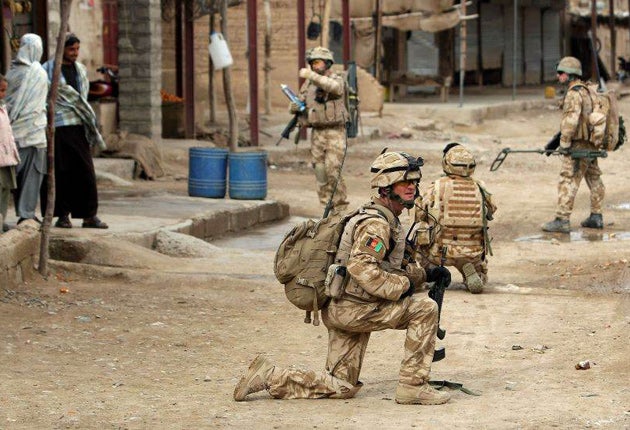MoD accused of cover-up after troop data reclassified
Figures on personnel shortages deemed secret after fears over security

Military chiefs were accused of a disgraceful cover-up last night as it was revealed that figures for troop shortages have been quietly reclassified as secret.
With the army in particular maintaining a demanding tempo of battle in Afghanistan, several specialist trades such as medics have had to cope with a shortfall in their numbers. Yet the Ministry of Defence said last night that the public would no longer be privy to just how low numbers in certain regiments are.
Figures obtained last year revealed serious shortfalls in countless trades, most notably among bomb disposal experts who are now so vital in Helmand. Statistics revealed a 42.5 per cent shortfall in Royal Logistic Corps Ammunition Technician corporals to staff sergeants and a 16.7 per cent shortfall in Royal Engineer explosive ordnance disposal troops of the same rank.
Intensive care nurses were down by 71.1 per cent, the Royal Electrical and Mechanical Engineers who keep vehicles going on the front line were 37.2 per cent down at corporal rank, while Merlin pilots were 36 per cent short. Infantry privates and lance corporals, the bulk of the frontline fighting force, were 10.7 per cent below strength.
But recent requests for up-to-date information have been turned down. Yesterday, the former Liberal Democrat leader Sir Menzies Campbell, who had previously asked for information on the number of medics in the forces, at a time when injuries in Helmand continue to escalate because of the increasing use of improvised explosive devices (IEDs), was told there was, he said, a "deeply disturbing" shortage.
As he revealed that the Defence Medical Services only had 476 medical officers out of a required trained strength of 818, defence minister Kevan Jones added that future data highlighting potential "pinch points", or shortages, in the armed forces would no longer be published as it would prejudice security.
A similar request by Tory MP Gerald Howarth in December was blocked by Armed Forces minister Bill Rammell, who said: "Information detailing pinch-point trades has been reclassified. I am withholding the information as its disclosure would, or would be likely to, prejudice the capability, effectiveness or security of the armed forces."
He added that the House of Commons Defence Committee would continue to be provided with the information. The Defence Board, which includes the service Chiefs of Staff as well as Whitehall mandarins including the Permanent Under Secretary for Defence, made the decision late last year, it emerged.
Shadow Defence Secretary Dr Liam Fox said: "This cover-up is disgraceful because it tries to hide from the British public the Government's failure to give our armed forces the skills they need to fight in Afghanistan."
Last night, a spokesman for the Defence Committee said it would be considering the implications of the reclassification at its next private meeting but presumed it meant that it would be banned from revealing any data.
Former commanding officer Patrick Mercer MP said: "This is simply camouflage to prevent people understanding the level of incompetence inside the Ministry of Defence. For instance, why are there gross shortages of recruits across the Army at the moment despite the fact that record numbers of young civilians wish to join?"
Sir Menzies said: "Are we to understand that whenever the Government feels embarrassed it is going to claim a similar right? I can well understand that highly sensitive information which might be of immense value to an adversary could be concealed. But the state of the medical services surely does not fall into that category when it should be of serious public interest and political concern.
"If the government is going to throw a blanket over any defence information it doesn't want revealed in public, parliamentary scrutiny is bound to be affected," he added.
An MoD spokesman said: "We decided late last year to remove pinch-point data from external performance reports because the information could be useful to our enemies."
Subscribe to Independent Premium to bookmark this article
Want to bookmark your favourite articles and stories to read or reference later? Start your Independent Premium subscription today.

Join our commenting forum
Join thought-provoking conversations, follow other Independent readers and see their replies